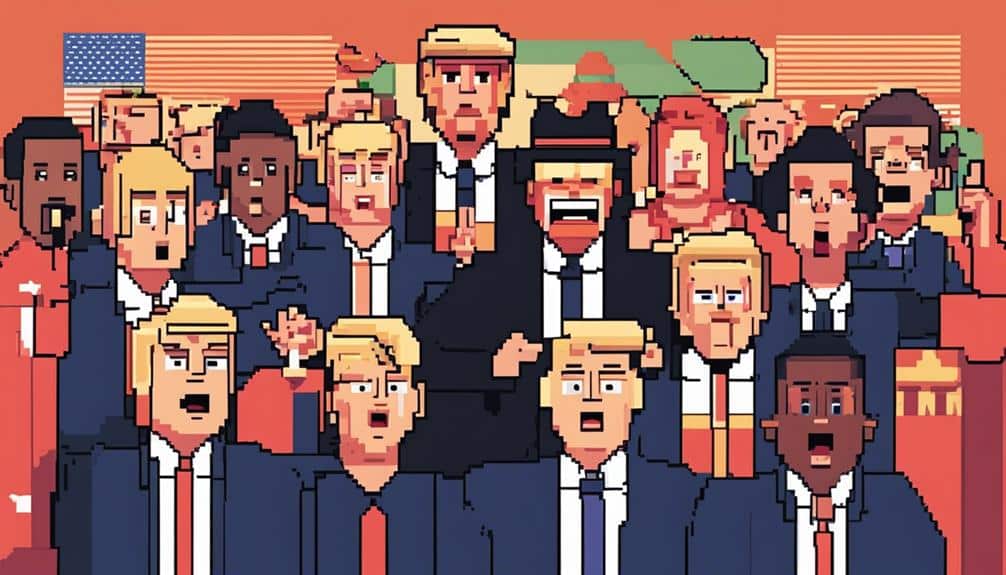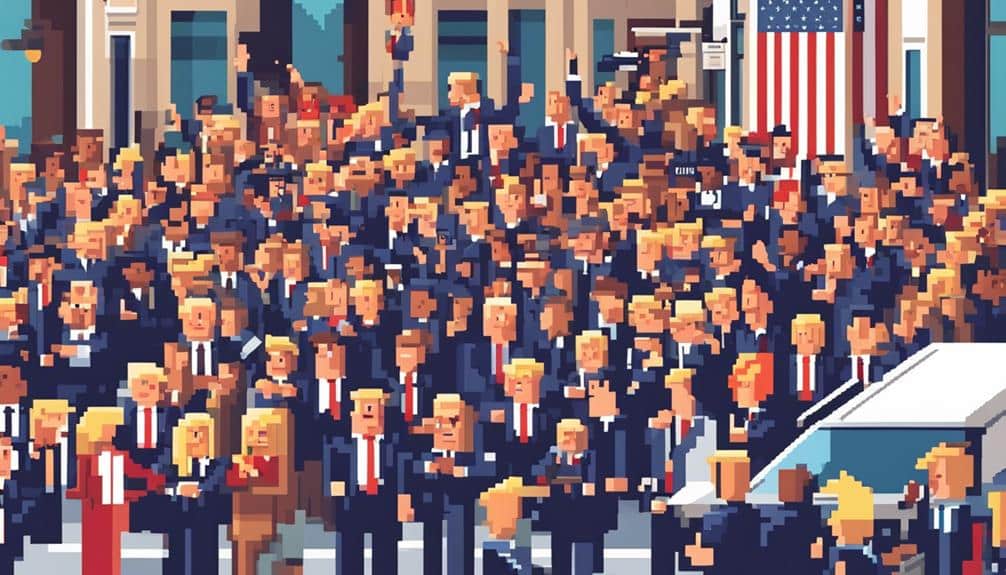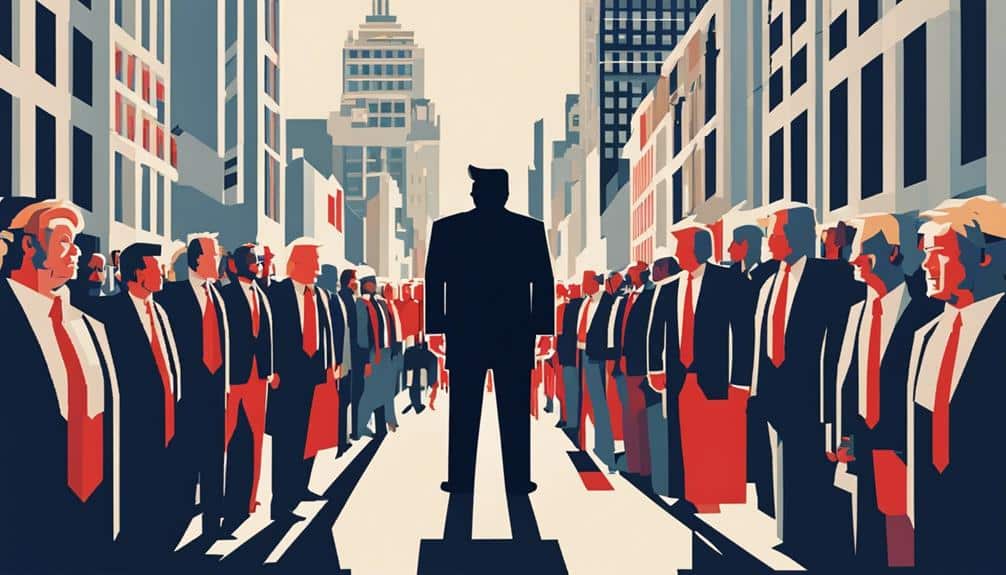So, Trump claims he could shoot someone on Fifth Avenue and keep supporters – talk about loyalty! It's like a political tightrope act, balancing ethics and blind allegiance. Imagine the mental gymnastics! Public outcry could sway voters, maybe hit Trump's ratings. But hey, he still has die-hard fans cheering! It's a wild ride where morals and politics collide. Follow along to see how this outlandish statement plays out in the chaotic world of political shenanigans. Stick around to uncover the twists and turns of this contentious saga.
The Context of Trump's Remark

Imagine this: You're strolling down Fifth Avenue, minding your own business, and suddenly, there's Trump, armed and dangerous, aiming at someone. But wait, his supporters cheer him on! It's like a twisted reality show where shooting someone is a winning strategy.
Trump's statement reflects a bizarre mix of blind loyalty and unquestioning support. It's as if his followers have donned some sort of political blindfold, willingly ignoring any actions that would be deemed unacceptable from anyone else.
The sheer audacity of the claim is almost comical, painting a picture of a leader who could do no wrong in the eyes of his devotees.
Political Loyalty Vs. Moral Standards

So, you're telling me that in politics, it's like a loyalty card at your favorite coffee shop – punch in enough times, and you get rewarded, regardless of what you order?
Public opinion seems as fickle as a cat chasing a laser pointer, leading the way without a care for moral compasses.
But hey, who needs ethics when you've got a crowd cheering, right?
Loyalty Vs. Ethics
Political loyalty often clashes with moral standards, creating a dilemma for individuals in positions of power. Imagine this: you're balancing on a tightrope, with political loyalty on one end and ethics on the other. It's like juggling fire while walking a moral high wire. This tightrope act requires finesse, as one misstep could lead to a spectacular ethical face-plant.
In the domain of politics, loyalty often seems to be the golden ticket, allowing one to bypass ethical roadblocks with a wink and a nod. It's like having a get-out-of-jail-free card, but instead, it's a get-out-of-ethics card. Who needs moral fiber when you have unwavering political support?
But here's the kicker: ethics should be the compass guiding actions, not loyalty blinding judgment. It's like choosing between a shiny apple and a rotten one just because the rotten one is labeled 'loyalty.'
When faced with this dilemma, remember that ethics are the true north, guiding you through the murky waters of political loyalty.
Public Opinion Influence
When maneuvering the delicate balance between public opinion influence and moral standards, prioritizing ethical values over political loyalty is crucial. In today's world where a statement like 'I could stand in the middle of Fifth Avenue and shoot somebody and I wouldn't lose any voters' can be uttered without consequence, it's imperative to question the extent of political loyalty and its impact on societal moral standards. Are we really okay with sacrificing our ethical compass on the altar of blind allegiance?
Political loyalty shouldn't be a free pass for reprehensible behavior. The idea that support for a candidate is unwavering regardless of their actions undermines the very fabric of a civilized society. It's akin to saying, 'I'll stick with you no matter what, even if you set fire to the rulebook and dance on its ashes.'
In a world where public opinion can be swayed by charisma rather than character, it's crucial to reassess what truly matters. Let's not turn a blind eye to moral decay in the name of political expediency. After all, loyalty should be earned, not blindly given.
Accountability in Politics
Accountability in politics requires a careful balance between upholding moral standards and demonstrating unwavering political loyalty.
When it comes to maneuvering the murky waters of political ethics, here's a satirical breakdown to help you grasp the nuances:
- Moral Flexibility: Politicians often showcase an impressive ability to twist moral standards like a contortionist. It's like watching a magician pull a rabbit out of a hat, except the rabbit is questionable ethics.
- Political Tightrope Walking: Balancing on the thin line between political loyalty and personal integrity requires the finesse of a tightrope walker. One wrong step, and you might find yourself plummeting into the abyss of public scrutiny.
- Ethical Gymnastics: Engaging in mental gymnastics to justify questionable actions seems to be a prerequisite for many in politics. It's like watching a logic-defying acrobatic performance, where the only winner is moral ambiguity.
In the circus of politics, the show must go on, even if the acts sometimes defy all sense of reason and decency.
Media and Public Reaction

The media and public swiftly reacted to Donald Trump's shocking statement about being able to shoot someone on Fifth Avenue without losing any voters. News outlets buzzed with disbelief, wondering if this was a new campaign strategy or just another day in politics.
Social media exploded with memes and hashtags, with users jokingly suggesting locations where other candidates might try their luck next. The public seemed split between outrage and dark humor, with some expressing genuine concern while others turned it into a punchline for late-night comedy shows.
Reporters scrambled to get reactions from Trump's supporters, who seemed unfazed by the remark, citing their unwavering loyalty. Pundits debated the impact of such brazen statements on an already tumultuous political environment, with some questioning the boundaries of acceptable rhetoric.
In a world where reality often outstrips satire, Trump's words managed to shock even the most jaded observers, leaving many wondering what could possibly come next in this unprecedented era of politics.
Psychological Analysis of Supporters

Analyzing the psychology of Donald Trump's supporters reveals a complex interplay of loyalty, identity, and perceived outsider status. Here's a glimpse into the minds of those who stand by the man who claims he could shoot someone on Fifth Avenue and not lose any voters:
- Cult of Personality: Many supporters are drawn to Trump's larger-than-life persona, seeing him as a strong, decisive leader who speaks his mind without filters.
- Us vs. Them Mentality: Trump's rhetoric often pits his supporters against perceived enemies, creating a sense of camaraderie and shared identity among his base.
- Anti-Establishment Sentiment: Trump's outsider status and disdain for traditional politics resonate with supporters who feel disillusioned by the status quo and seek a disruptor in the political arena.
In the whirlwind of Trump's polarizing presence, his supporters find a sense of belonging and purpose, fueling their unwavering allegiance despite controversial statements and actions.
Legal and Ethical Ramifications

Considering the controversial statement made by Donald Trump about shooting someone on Fifth Avenue, legal and ethical implications arise regarding his accountability and the impact on public perception.
Now, let's explore the delightful world of legality and ethics when the leader of the free world casually throws around shooting scenarios. Legally speaking, shooting someone on Fifth Avenue, or anywhere for that matter, tends to raise a few red flags – something about laws, rights, and all that jazz.
Ethically, well, shooting people isn't exactly the gold standard of moral behavior. It's like trying to pass off a burger as a salad because it has lettuce in it – close, but not quite. So, imagine the courtroom drama, the ethical debates, and the public uproar that would follow such a statement.
It's like a Shakespearean tragedy meets a reality TV show, with a sprinkle of political chaos for that extra oomph. Welcome to the world where shooting someone is just another day's work.
Impact on Trump's Approval Ratings

Trump's statement about shooting someone on Fifth Avenue could potentially have a significant impact on his approval ratings. Here's how this outrageous claim might affect his standing among the public:
- Polarization: Supporters might view this as a display of Trump's boldness and unwavering confidence, further solidifying their loyalty.
- Moderate Voter Shift: Some moderate voters, already on the fence, could find this statement too extreme, causing a slight dip in approval ratings.
- Public Outcry: The general public's reaction could lead to widespread condemnation, potentially swaying undecided voters away from supporting Trump.
In the world of politics, where every word and action is scrutinized, Trump's bold remark might be a high-risk, high-reward move that could either solidify his base or alienate a significant portion of the electorate. Only time will tell how this shocking statement plays out in the court of public opinion.
Comparisons to Past Political Statements

So, you think Donald Trump's statement about shooting someone on Fifth Avenue was outlandish? Well, get ready for a blast from the past as we compare it to other eyebrow-raising political remarks.
Let's take a trip down memory lane to analyze how historical context can shed light on the ethical implications of such bold statements.
Get your popcorn ready; this ride might be bumpier than a politician's promise during election season!
Historical Context Analysis
When analyzing historical context, it's essential to compare Donald Trump's statement about shooting someone on Fifth Avenue to past political remarks made by other figures.
Here's a humorous take on the comparison:
The Hyperbolic Hypothesis: Trump's claim seems like an extreme exaggeration, but let's not forget the colorful history of political hyperboles. From Nixon's 'I am not a crook' to Clinton's 'I didn't have sexual relations with that woman,' politicians have a knack for memorable overstatements.
Outlandish Outliers: While Trump's statement may sound shocking, it's not the first time a public figure made a jaw-dropping comment. Remember when Vice President Biden told a wheelchair-bound state senator to stand up? Sometimes, politicians' words defy logic.
The Absurdity Archive: Political history is rife with eyebrow-raising quotes. Whether it's Sarah Palin's 'I can see Russia from my house' or George W. Bush's 'Rarely is the question asked: Is our children learning?' – bizarre statements are part and parcel of the political sphere.
Ethical Implications Review
Drawing parallels between Donald Trump's infamous statement on Fifth Avenue and past outrageous political remarks sheds light on the significant implications of such statements in the political domain.
While Trump's assertion may seem extreme, it's not the first time politicians have made eyebrow-raising comments. Remember when former Senator Todd Akin suggested that 'legitimate rape' rarely causes pregnancy? Or when Vice President Joe Biden told a wheelchair-bound state senator to stand up?
These instances, like Trump's bold claim, raise questions about the boundaries of political discourse.
The ethical implications of such statements are concerning. Politicians are expected to uphold a certain level of decorum and respect, yet these outlandish remarks blur the line between acceptable and unacceptable behavior. By making outrageous statements, politicians risk normalizing inappropriate conduct and desensitizing the public to unethical behavior.
It's important to hold our leaders to a higher standard and demand accountability for their words and actions. After all, if shooting someone on Fifth Avenue doesn't lose you voters, where do we draw the line?
Long-Term Implications and Legacy

The long-term implications and legacy of Donald Trump's statement about shooting someone on Fifth Avenue are significant in shaping public perception and political discourse. This outrageous declaration has left a lasting mark on the political terrain, sparking debates and reflections that continue to reverberate through the corridors of power and the minds of the electorate.
Here's why this statement will be etched into the annals of history:
- Normalization of Extreme Rhetoric: Trump's brazen comment has pushed the boundaries of acceptable discourse, paving the way for a new era of shock politics where outlandish statements aren't only tolerated but expected.
- Erosion of Political Accountability: By suggesting that his supporters would stand by him no matter what he does, Trump has blurred the lines between loyalty and blind allegiance, setting a dangerous precedent for future leaders.
- Impact on Public Trust: The nonchalant attitude displayed in the statement has raised questions about the sincerity and integrity of political figures, casting a shadow of doubt over the trustworthiness of those in power.
Conclusion
Well, it seems like Trump's confidence in his supporters knows no bounds. If he can get away with shooting someone on Fifth Avenue and still keep their loyalty, what else could he possibly do?
Maybe juggling flaming swords on Pennsylvania Avenue? Or tightrope walking over the White House? Who knows, the possibilities are endless when it comes to the unwavering support of the Trump train.
All aboard, folks!
